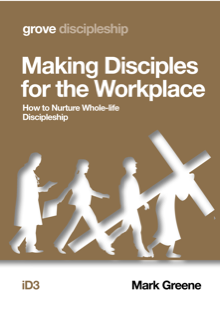How can we disciple Christians for the workplace?

Mark Greene, former Executive Director at the London Institute of Contemporary Christianity (LICC), has released his new book "Making Disciples for the Workplace", part of the Grove Books discipleship series.
Greene spoke to Charlene Nwodo about his new publication, the challenges Christians face in the workplace and what churches can do to support them.
CT: Why is the topic of discipling Christians for the workplace so timely now?
Mark: Back in 2000 I wrote a booklet called "Supporting Christians at Work", and we've learned a lot since then about which ideas work best and why.
Since then, we've seen that much of church discipling and Bible-teaching is sacred-secular divided. It has been focused on weekends and on evenings but not on the whole of life. So the real challenge for local churches is not about making disciples for the workplace but about making disciples for the places God's people find themselves beyond the church Monday to Saturday.
In 2006, we began to work with local churches to learn together how we might create a whole-life disciplemaking culture. Now, there are more churches that look like whole-life disciplemaking churches than there used to be, and there are also churches that disciple for the workplace.
And it's some of those tried and tested ideas that we've put in "Making Disciples for the Workplace".
CT: What is one of the key messages of "Making Disciples for the Workplace"?

Mark: Eighty per cent of what a worker needs to know to be fruitful for Christ in the workplace is exactly the same as what any Christian needs to know to be effective out in their Monday to Saturday world. And that means that church leaders can help the workers they have, even in churches where they don't have many of them - and lots don't due to their ageing congregational profile.
CT: How can churches bridge the age gap and make work a relevant topic for all generations in their congregation?
Mark: Churches need to have a shared language to help their members understand the idea of everyday mission. LICC, for example, uses the word "frontline". It's shorthand for a place away from church where we meet people who don't know Jesus. Someone's frontline could be their workplace, the school gate or their sports club. And everyone gets to choose the frontline they want to focus on.
CT: Many Christians in secular jobs work in toxic environments where they feel there is no place to share the Gospel. How can they see purpose in their work as part of their everyday mission?
Mark: There are many biblical examples of God's people working in pagan or hostile environments. David, for example, mentions 'enemies' in at least 53 out of his 75 Psalms. His work was often life-threatening but that was his calling. Our workplace may be tough, but it is extremely likely God wants to work through us right there – for as long as we're there.
Indeed, Jeremiah 29:7 makes it clear that Babylon, the place of exile, is where God wants His people to seek peace and wholeness, not only for themselves but also for the city and the people in it. We seek the wellbeing, the transformation as well as the salvation of those around us. And we pray for it. To be a disciple of Jesus is to join a movement to change the world. We contribute to that through our daily tasks which, for the most part, serve the common good in some way.
So the goal for Christians at work is not to share the Gospel within a week. It is to work well, love our neighbour-colleagues, develop relationships of trust, and to seek to show wisdom through our action and words. This, over time, invariably leads to opportunities to share the difference Jesus makes in their lives.
CT: Apart from challenging environments, what are other barriers that Christians in paid work encounter?
Mark: One of the common demotivators for Christians is that many believe that there are only three ways to be fruitful for Christ:
- Volunteer in the local church.
- Be involved in direct social action, e.g., helping the poor, volunteering at a food bank or helping a neighbour.
- Have an evangelistic conversation.

All good things, of course. But fruitfulness in Christ is much richer than that, so we realised that we needed to give people a biblical framework for fruitfulness. Otherwise, people think they are failures. I've even met doctors who think the highest calling would have been to be a pastor, and if not that, then at least to have been an overseas medical missionary.
So we came up with six main ways to be fruitful – the six 'M's: modelling godly character, making good work, ministering grace and love, moulding the culture we're in, being a mouthpiece for truth and justice, and being a messenger of the Gospel. There are short films and lots of material about that at www.licc.org.uk.
CT: How can the ideas presented in "Making Disciples for the Workplace" help churches support their working congregation?
Mark: To implement the ideas, churches do not require extra money, extra staff or even extra things on their programme. In the case of church leaders, it requires a shift in consciousness and an increase in curiosity about people's everyday lives. It's easy to begin: just add a workplace question onto a conversation you were going to have anyway – about the coffee rota, for example. One simple extra question in a phone call or over coffee after the service opens a new door and shows that the church is interested in people's work.
And we also encourage pastors to visit one of their members on their frontline once every month or six weeks. Those who do it say that nothing has helped them more to empower God's people for everyday ministry. Not everyone feels they have the time to do that but anyone can add an extra question to a text or conversation.
"Making Disciples for the Workplace" is available here.











